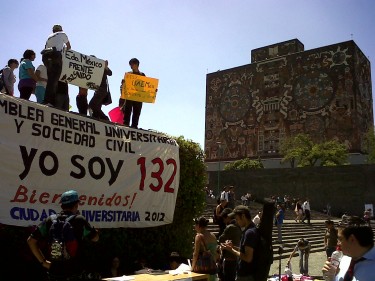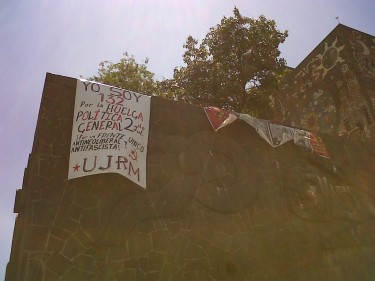All links lead to Spanish-language websites unless otherwise noted.
As we previously reported [en], a movement now identified as #YoSoy132 emerged in Mexico on May 11, 2012, taking shape amid the ongoing electoral process to choose the next president. It is a youth movement, perhaps a student mobilization, non-partisan according to its press releases, incipient but powerful, and has succeeded to draw thousands of people to its events, as well as its meetings and marches.
Attorney Miguel Carbonell (@MigelCarbonell) anticipated, in a tweet from May 24, 2012, one of the challenges for this movement:
El movimiento juvenil tiene enfrente el gran desafío de pasar de la protesta a la propuesta.
The blog Sendero de Fecal published this text in which some of the movement's objectives are mentioned:
El movimiento se plantea evitar que un candidato presidencial pueda ser impuesto por la oligarquía del país y los poderes fácticos presentes en los tres poderes del gobierno de la república, así como organizarnos para responder a un probable fraude electoral diseñado con antelación.
Este no debe ser un movimiento solo de coyuntura electoral, sino es un movimiento que busca cambiar el país, encausar las demandas de justicia de la población y se plantea resolver los graves problemas que padece el país en todos los sectores que atañen a la sociedad mexicana.
The movement means to prevent a presidential candidate from being imposed by the country's oligarchy and the powers-that-be present in the three branches of government, as well as means to mobilize ourselves in advance in order to respond to likely electoral fraud.
This should not be a movement only for election time, but also a movement that looks to change the country, carry out the demands for justice from the population and move to resolve the grave problems that afflict the country in all sectors that concern Mexican society.
Moreover, the blog Kaniwa described the youth movement like this:
Movilizados en torno a demandas -en realidad, desde hace mucho, exigencias irreductibles- muy específicas (democratizar los medios, alentar la competencia real en las telecomunicaciones, rechazo a la imposición de uno de los candidatos por parte del duopolio televisivo conformado en México por Televisa y TV Azteca, garantizar el derecho al acceso a Internet para toda la población, eliminando con ello la brecha digital que mantiene a más de la mitad de la población sin acceso a estos medios), decenas de miles de jóvenes universitarios de todo el país, encabezados por una “masa crítica” que lo detonó todo, de entre los estudiantes de la Universidad Iberoamericana, están retando al país a despertar, a rechazar el control manipulador de los grandes medios masivos de comunicación, usando los instrumentos de su generación: Facebook, Twitter y Youtube.
For many it is inevitable to recognize some elements of the discourse of one of the candidates for the Mexican presidency in these descriptions of the movement; the fact that the members of #YoSoy132 point specifically to a candidate or support another has led to conflicting opinions among Twitter users.
Carlos García (@imaurum), whose profile picture features an illustration that contains the phrase #YoSoy132, took note of the widespread disapproval that according to his view exists for one of the candidates, while not wasting the opportunity to denigrate him with a description:
En redes sociales, en la calle, en las universidades, en el super, en tofos lados desaprueban al PRI y a su títere Peña Nieto [sic]
Given the persistence of statements such as these, Twitter users such as attorney Gerardo Laveaga (@GLaveaga) have questioned if #YoSoy132 in effect supports or is against any candidate:
Sólo para entenderlo mejor: ¿ #YoSoy132 es un movimiento para apoyar a #AMLO o para combatir a @EPN ?
Kazbam blogged about this discourse of “non-partisanship” and other topics that have made him distance himself from the movement:
Ahora bien, los 132 dicen que son apartidistas. Pero también dicen que son anti-PRI y anti-Peña Nieto. Me gustaría que me explicaran cómo poder rechazar a un candidato y a un partido sin apoyar a los otros contendientes. Ser apartidista no es no apoyar a un partido, es eso y no rechazar a uno en particular.
He concluded, breaking it down:
Ah, y ya nada más quiero aclarar, para que no haya confusiones, que no por considerarme fuera del movimiento de los 132 estoy a favor del candidato del PRI. No voy a votar por “el copetes”, no se confundan.
Abel Alejandro Heras (@aheras) reached the point of denouncing the insults he had received from sympathizers of a political party for having expressed his opinion about the movement:
Cuando opiné de la #MarchaYoSoy132, lo menos que obtuve fueron mentadas [insultos], con marcado tinte Perredista [del PRD], no mejor paso.
In the same way, the blogger from Cachitos de mi Vida made reference to the insults and asked:
¿Queremos un país más tolerante y democrático? ¿Entonces por qué denostar a aquellos que van a votar por X, Y o Z? Una cosa es criticar la trayectoria política y la plataforma de un candidato y otra muy diferente es insultar a quienes eligen determinada opción política.
Jaime Benítez (@El_Mesie) looked (like many others) to demarcate the movement with the use of the #YoNoSoy132 hashtag, while accusing the movement of having been “kidnapped” by the National Regeneration Movement (“MORENA”) which promotes on of the presidential candidates:
Desvirtuada la #MarchaYoSoy132 x ahora ser d #MORENA dejo de ser apartidista,Rucos como @epigmenioIbarra la secuestraron #YoNoSoy132 #mexico
For his part, Gerardo Arellano (@ARELFC) wrote about the “hijacking” of the movement by a group with socialist tendencies, and even shared a photograph to prove it:
Terrible. La #MarchaYoSoy132 es secuestrada ya por gente que se asume como socialista. pic.twitter.com/WPXbO6Pv
Representing another frame of mind, Rafael Medina (@rafilla_rm) questioned why the “student” movement doesn't demand that educators (who have protested throughout the country having to submit to a job evaluation) should return to their classrooms:
@CarlosLoret Por que no han salido los #yoSoy132 a exigir que Los maestros regresen a clases y acepten la evaluacion?
Given all the activism over the last few days that has spread over Twitter and other networks, user Osvaldo Suarez (@paul_suco) reminded:
Tenemos que ser conscientes de que un voto razonado no se construye desde las redes sociales.
There are 31 days left until the people of Mexico will have to choose their next president. The #YoSoy132 movement certainly has established itself among public opinion in a quick and timely manner; nevertheless its reach, its objectives and its commentary have generated exchange between those with differing opinions. We can only hope that it is understood that elections are won with votes (in the ballot boxes) and not with tweets.









9 comments